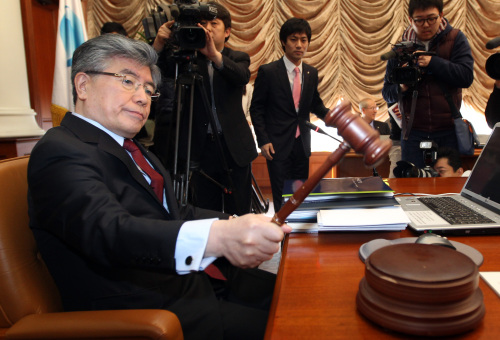South Korea's central bank raised the key interest rate on Thursday by a quarter percentage point in a bid to put a lid on growing inflationary pressure sparked by rising oil and food prices.
Bank of Korea (BOK) Gov. Kim Choong-soo and his fellow policymakers hiked the benchmark seven-day repo rate, dubbed the base rate, to 3 percent, following a rate freeze in February. It marked the fourth rate increase since July last year from a record low of 2 percent.

The decision is in line with a forecast by 10 economists at 17 financial institutions surveyed by Yonhap Infomax, the financial news arm of Yonhap News Agency.
The rate hike came as rising oil, commodity and food prices are exerting upward pressure on consumer prices amid economic uncertainties stemming from political upheavals in the Middle East and North Africa.
"The growth of consumer prices is picking up in the 4 percent range and demand-pull inflationary pressure is also rising," said Kim Yoon-gee, an economist for the Daishin Economic Research Institute, before the decision.
"As an expansion of economic uncertainties is limiting the pace of the local currency's gain, a rate hike is necessary to pursue gradual policy normalization and curb inflation."
South Korea is facing growing difficulties in curbing inflation as rising oil and commodity prices, and a gain in food costs, sparked by the outbreak of foot-and-mouth disease, are putting upward pressure on consumer inflation.
The country's consumer prices jumped 4.5 percent in February from a year ago, up from 4.1 percent in January and the fastest growth in 27 months. Consumer prices surpassed the upper ceiling of the BOK's 2-4 percent inflation target band for the second straight month.
Core inflation, which excludes volatile oil and food prices, grew 3.1 percent in February from a year earlier, the most in 18 months, indicating that demand-pull inflationary pressure is growing.
The government has been making efforts to stabilize prices since it declared a "war" on inflation, mindful of concerns that higher inflation will undercut the growth momentum.
The government has unveiled a set of anti-inflation measures such as freezing public utility fees, easing import taxes on basic goods and cracking down on price-rigging. But despite such all-out efforts, there is no sign of easing in inflation yet.
Finance Minister Yoon Jeung-hyun on Wednesday cast a similar view, saying that South Korea is facing a very difficult situation in curbing inflation as supply side and economic growth and ample liquidity are adding upward pressure on consumer prices.
The Korean economy is on a solid recovery track, aided by brisk exports and a pickup in domestic demand. Industrial output grew
13.7 percent on-year in January and the on-year growth of the indicator on the country's future economic outlook rebounded for the first time in 13 months.
Experts said that the BOK is forecast to continue to normalize the accommodative policy stance taken to fight the global financial turmoil, but the pace and the speed of a rate increase will largely hinge on external economic conditions.
Concerns about repercussions from political unrest in North Africa and the Middle East persist as a potential prolongation of such tension is feared to jack up oil prices, sapping the global recovery.
The government is targeting 5 percent economic growth this year while containing inflation at around 3 percent. The BOK's inflation projection stands at 3.5 percent for 2011. (Yonhap News)
<관련기사>
한은, 기준금리 0.25%P 인상..3.0%
2008년 12월이후 2년3개월만에 3%대 복귀
`중동리스크' 불구 천정부지 물가 우선고려한듯
(서울=연합뉴스) 이강원 기자 = 한국은행 금융통화위원회(금통위)가 2011년 들 어서도 지속적으로 물가가 급등하자 금융시장의 예상대로 기준금리를 0.25%포인트 인상했다.
금통위는 10일 김중수 총재 주재로 정례회의를 열어 기준금리를 연 2.75%에서 3 .00%로 올렸다. 또 총액대출 한도 금리도 0.25%포인트 올렸다.
금통위가 지난해 11월을 기점으로 한 격월 기준금리 인상 행진을 이어가면서 기 준금리는 지난 2008년 12월 이후 2년3개월만에 처음으로 3%대로 진입했다.
금통위가 기준금리를 올린 것은 올해 들어 연속 2개월째 소비자 물가상승률이 한은의 물가안정 목표치(3.0±1.0%)를 이탈하면서 물가불안이 가중되고 있다는 점을 우선적으로 고려한 것으로 보인다.
특히 일부에서는 리비아발 `중동사태'와 구제역 파동, 저축은행 부실 문제 등으 로 인한 대내외 위험요인이 상존하는 만큼 기준금리를 올리면 경기하락이 우려된다 는 지적이 있었던 것으로 알려졌으나 결국 고려요인이 되지 못했다.
결국 금통위가 기준금리를 올린 것은 새해 들어 농수산식품 가격이 급등하는 등 물가불안이 확산되고 있는 상황에서 시중의 돈줄을 죄어 물가상승을 억제하려는 조 치로 풀이된다.
아울러 기준금리 인상에 따른 대출금리 상승을 유도, 위험 수준에 임박한 가계 부채의 총액이 더이상 불어나지 않도록 하겠다는 의지도 반영된 것으로 보인다.
하지만 이번 기준금리 인상으로 은행들이 대출금리를 올릴 수밖에 없는 만큼 가 계와 기업의 자금조달 비용과 이자 상환 부담도 그만큼 커질 것으로 예상된다.
특히 지난해 하반기부터 새해 들어서까지 물가가 급등세를 지속하고 있는 상황 에서 금통위가 2년3개월만에야 `뒤늦게' 기준금리를 3%대로 끌어올린 데 대한 비난 여론도 제기될 가능성이 높아졌다.
이미 금융시장에서는 지난 9일 현재 은행 대출금리의 기준금리 역할을 하는 양
도성예금증서(CD) 91일물 금리가 1월12일 2.80%에서 3.30%로 0.50%포인트나 급등했 다. 이러한 CD금리 상승폭은 기준금리를 두 차례나 인상한 것과 맞먹는 수준으로 이 날 금통위의 기준금리 인상을 선반영한 것으로 보인다.
새해들어 두달 연속 소비자 물가상승률이 한은의 목표치를 상회하기 이전인 지 난 1월 금통위에서도 상당수 위원은 "실제 물가상승률이 전망치보다 높아질 가능성 이 크다"고 우려하고 "경기부양을 위해 완화적 통화정책(금리동결)을 지속하면 경제 전체의 심각한 불균형이 생겨 더 심한 물가불안이 나타날 수 밖에 없다"면서 금리 인상을 강하게 주장했었다.



![[AtoZ into Korean mind] Humor in Korea: Navigating the line between what's funny and not](http://res.heraldm.com/phpwas/restmb_idxmake.php?idx=644&simg=/content/image/2024/04/22/20240422050642_0.jpg&u=)
![[Exclusive] Korean military set to ban iPhones over 'security' concerns](http://res.heraldm.com/phpwas/restmb_idxmake.php?idx=644&simg=/content/image/2024/04/23/20240423050599_0.jpg&u=20240423183955)



![[Graphic News] 77% of young Koreans still financially dependent](http://res.heraldm.com/phpwas/restmb_idxmake.php?idx=644&simg=/content/image/2024/04/22/20240422050762_0.gif&u=)
![[Herald Interview] Why Toss invited hackers to penetrate its system](http://res.heraldm.com/phpwas/restmb_idxmake.php?idx=644&simg=/content/image/2024/04/22/20240422050569_0.jpg&u=20240422150649)





![[Exclusive] Korean military to ban iPhones over security issues](http://res.heraldm.com/phpwas/restmb_idxmake.php?idx=652&simg=/content/image/2024/04/23/20240423050599_0.jpg&u=20240423183955)



![[Today’s K-pop] Ateez confirms US tour details](http://res.heraldm.com/phpwas/restmb_idxmake.php?idx=642&simg=/content/image/2024/04/23/20240423050700_0.jpg&u=)